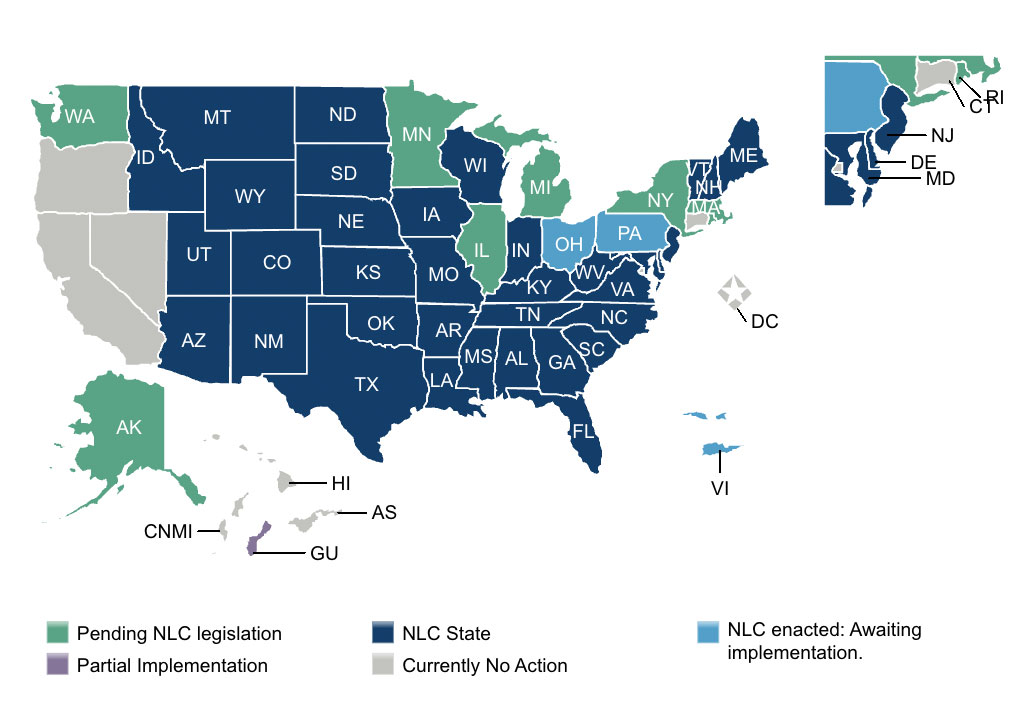What is the Nursing Licensure Compact?
The Nursing Licensure Compact (NLC) was created in 2000 as an agreement between states allowing nurses to practice across state lines with one license, increasing access to patient care while maintaining public protection at the state level.
In 2018, the Enhanced Nursing Licensure Compact (eNLC) was implemented to improve the original NLC, allowing registered nurses (RNs) to have one multistate license, with the authority to practice in person or through telehealth services within their own state and throughout other eNLC states. It is run by the Commission of Nurse Licensure Compact Administration (NCSBN).
The eNLC benefits providers, patients and healthcare organizations by:
- Increasing access to healthcare for patients across borders
- Reducing overall costs to facilities and patients
- Improving efficiency of healthcare delivery
- Allowing more telehealth services to take place
- Relieving burnout from overwhelmed nurses
How do nurses join the NLC?
If your primary state of residence is part of the compact, you may be eligible for a multistate license. Residents of noncompact states are able to apply for a license by endorsement in a compact state, but eligibility is limited to a single state license that is valid in that state only. However, you can have multiple single-state licenses.
If your state of licensure is not currently a member of the NLC, but becomes one, the state board will reach out to all nurses registered within that state. All you need to do is ensure your permanent address is the same.
How much does it cost?
Use the state board of nursing application for licensure by exam or by endorsement, as found on your board of nursing’s website. Licensure fees vary by state.
How do I apply for a Compact license?
An applicant for licensure in a state that is part of the NLC will need to meet the following uniform licensure requirements:
- Meets the requirements for licensure in the home state (state of residency);
- Has graduated from a board-approved education program or from an international education program);
- Has passed an English proficiency examination;
- Has passed an NCLEX-RN® or NCLEX-PN® Examination or predecessor exam;
- Is eligible for or holds an active, unencumbered license (i.e., without active discipline);
- Has submitted to state and federal fingerprint-based criminal background checks;
- Has not been convicted or found guilty, or has entered into an agreed disposition, of a felony offense under applicable state or federal criminal law;
- Has no misdemeanor convictions related to the practice of nursing;
- Is not currently a participant in an alternative program;
- Is required to self-disclose current participation in an alternative program; and
- Has a valid United States Social Security number
What is the Cost?
When the initial application is submitted to the IMLC there is a $700 fee. Once you receive the Letter of Qualification you can choose to get a license in as many participating compact states as you wish. The $700 fee is only charged one time, and is not charged for each state you wish to get a license. However, the $700 licensing application fee must be paid again after 365 days if you wish to apply for the Compact license again.
Once the compact states are selected in which you wish to receive a license, the state fee for each state will be paid to the IMLC who will then remit the payment to the state.
If during the first application you do not select all states, your Letter of Qualification is good for 365 days after issuance so you can go back and apply for additional states. This includes states that may get added in that 365 days to the list of compact states. If you apply for additional states after the initial application there is a $100 processing fee.
